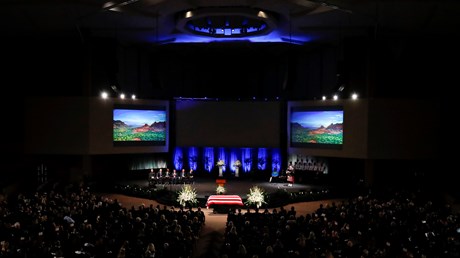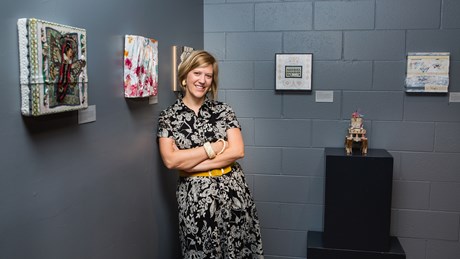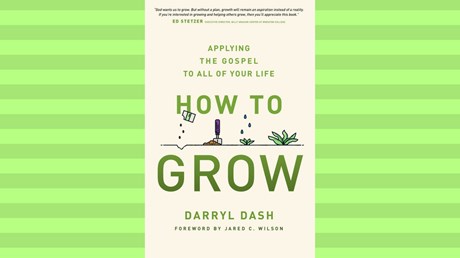Friday, 31 August 2018
Proverbs 22:6
from
https://www.biblegateway.com/passage/?version=NIV&search=Proverbs%2022:6
How I Define “Atheism”
from
http://www.patheos.com/blogs/tippling/2018/09/01/how-i-define-atheism/
What Are Evangelicals Afraid of Losing?
President Trump’s appeal to fear ignores that Christians seek first the Kingdom, not political favors.

In a Monday meeting with evangelical leaders at the White House, President Trump reportedly warned of violence against conservative Christians if the GOP loses in November. Evangelicals, he said, were “one election away from losing everything.”
As evangelicals, we would do well to correct the president on this point. If an election can cause us to lose everything, what is it exactly that we have in the first place?
Surely we can be grateful for any public servant who upholds the First Amendment. And we should applaud fellow believers who ply their education and experience as lawyers to defend religious freedom (as long as they don’t seek to privilege Christianity legally above other religions).
However, the church does not preach the gospel at the pleasure of any administration or decline to preach it at another administration’s displeasure. We preach at Christ’s pleasure. And we don’t make his policies but communicate them. It’s not when we’re fed to lions that we lose everything; it’s when we preach another gospel. “What good will it be for someone to gain the whole world, yet forfeit their soul?” (Matt. 16:26).
And yet, swinging from triumphalism to seething despair, many pastors are conveying to the wider, watching public a faith in political power that stands in sharp opposition to everything we say we believe in. To many of our neighbors, the court chaplains appear more like jesters.
Something tremendous is at stake here: whether evangelical Christians place their faith more in Caesar and his kingdom than in Christ and his reign. On that one, we do have everything to lose—this November and every other election cycle. When we seek special political favors ...
from
http://feeds.christianitytoday.com/~r/christianitytoday/ctmag/~3/qtzEmribqik/evangelicals-trump-elections-losing-everything.html
The 11 Bible Verses Read at John McCain’s Memorial Services
One probably isn’t in your Bible.

Last Saturday, Arizona Senator John McCain, 81, died from complications related to brain cancer. For years, McCain and his family had attended North Phoenix Baptist Church and the church hosted his memorial service on Thursday, where Vice President Joe Biden and Arizona Cardinals wide receiver Larry Fitzgerald were among the high profile speakers who remembered their friend.
The church’s lead pastor Noe Garcia, who delivered the opening and closing remarks, told CT Pastors in an interview that his goal was to honor the late politician while also “giving people the hope of the gospel of Jesus Christ.”
“We sometimes make evangelism harder than it is, and we forget that the gospel can speak for itself. It doesn’t need our help,” said Garcia. “If I read John 3:16, that will be powerful enough.”
Garcia read more than John 3:16. He also quoted 1 Thessalonians 4:13–14, Romans 3:23, Romans 6:23, and John 3:16. Friend and activist Tommy Espinoza read 1 Corinthians 13:3 and 2 Timothy 4:6–7. And McCain’s children also read from the Bible: Bridget McCain, Ecclesiastes 3:1-2, and Andrew McCain, 2 Timothy 4:6–8.
On Saturday, the Washington National Cathedral in Washington, DC, will host a national memorial service, where presidents Barack Obama and George W. Bush will speak. Daughter Sidney McCain will read 2 Corinthians 5:6–8 and current South Carolina senator and McCain’s best friend, Lindsey Graham, John 15:12–13 and The Lord’s Prayer.
Former New Hampshire senator Kelly Ayotte will read from Wisdom 3:1–5, 9. The book, the Wisdom of Solomon, is included in Catholic and Orthodox churches’ Old Testament but not included in Protestant ...
from
http://feeds.christianitytoday.com/~r/christianitytoday/ctmag/~3/Xn7kt0TkegQ/john-mccain-memorial-service-bible-verse.html
A Season of Deep Lament: Heroes and Legends I Knew as a Child
I don’t know that I have many answers, but I know what is true and I must keep holding on.

When I was a teenager, my spiritual life was impacted greatly by Jesus Orlando, a Woodstock-style Christian gathering put on by Calvary Assembly of God in a field outside Disney World. Donna, my girlfriend (now wife) and I would join thousands of others to camp out, sing songs, and listen to dynamic teaching. As I became a speaker later on, I’ve always wanted to speak at such an event, and I talked to Harry Thomas, the owner of the biggest such festival (Creation Fest) about it once.
Harry was just sentenced to prison for child molestation.
And, as I look back, I remember that the pastor of Calvary Assembly resigned in 1981 after admitting to an earlier affair.
I was recently teaching in Manila. I was working through my slides on contextualization and missiologist David Sills was on one of them. I had to edit out his comments, although I explained to the students that I had done so.
He rightfully resigned last month.
Recently, I received an email from a fellow professor at Wheaton, saying,
Having this perpetual, suffocating fog of ick hanging over me day and night because of the new Bill Hybels reports, I am now trying to do research on C. H. Spurgeon and go to look up Christian George’s email address only to find he is out of his seminary position as of this summer for a moral failing.
Bill Hybels’ writings on leadership have been a central part of my leadership journey. Now, his own church is (again, rightfully) calling on him to repent.
One of my closest friends, and a key part of why I stayed in my denomination back in 2007, is Frank Page. He resigned over a “morally inappropriate relationship.”
Of course, these are not all the same issue, but they all hurt.
Heroes and Legends
The Styx song, “Show ...
from
http://feeds.christianitytoday.com/~r/christianitytoday/ctmag/~3/oZ18cT-db8k/season-of-deep-lament-personal-reflections.html
Heaven Shines, But Who Cares?
The Bible's blueprint for paradise lowers the awe-inspiring to the everyday.

What does heaven look like? What are we meant to understand about this coming kingdom from the descriptions in the Bible?
Reading about heaven in the Bible can be confusing—so confusing that we are tempted to look elsewhere to firm up our ideas on the afterlife. The popularity of books like 90 Minutes in Heaven and Heaven Is for Real attest to our desire for reassurance that heaven is a reality since the accounts we read in Scripture seem so unreal. Will its building materials really be the stuff of our greediest imaginings—gold, silver, and precious stones?
It’s hard to determine what the human authors of Scripture want us to know is true about heaven. It’s an even bigger challenge to grasp what the mentions of mansions, multitudes, gates, and angels in the kingdom of heaven mean for us now.
I am a competitive game player. A few years ago at a party, the host brought out Pictionary for the evening’s entertainment. Ready to wow the room with my skills, I glanced at the word on my card: difficult. I had played Pictionary for years and had never had a word that hard. My mind went blank.
Nothing seemed to rhyme with it or illustrate it. The timer ran out, and in utter frustration I said, “How ironic that my word was difficult!” Holding up the card as proof, I realized I had accidentally drawn not a card for game play but the instruction card listing each of the categories for different words. Difficult, indeed. I spent 60 seconds trying to illustrate an abstract idea, trying to draw the undrawable.
My dilemma made me think of the Book of Revelation. John, in describing the new heaven and the new earth, is playing the hardest round of Pictionary known to man—he is called upon to describe ...
from
http://feeds.christianitytoday.com/~r/christianitytoday/ctmag/~3/3HNLmVNfaVg/wilkin-heaven-shines-but-who-cares.html
Thursday, 30 August 2018
Psalm 95:6-7
from
https://www.biblegateway.com/passage/?version=NIV&search=Psalm%2095:6-7
Langston on the Validity of Christian Conversions from Atheism
from
http://www.patheos.com/blogs/tippling/2018/08/30/langston-on-the-validity-of-christian-conversions-from-atheism/
Interview: God Calls Me to Motherhood and Art. How Do I Do Both?
The co-founder of a new art and vocation institute in South Carolina aims to address the intersection of faith, family, creativity, and calling.

This summer, the Leaf Institute of Art and Vocation, a nonprofit aimed at integrating art education, vocational formation, and the Christian faith, opened its doors in Greenville, South Carolina. Located in the growing arts district of this mid-sized Southern town, Leaf’s faith-driven mission sets it apart from surrounding studios. It’s co-founder, Michelle B. Radford, is an educator and studio artist, as well as a mother to young children.
Instead of viewing motherhood as a barrier to her artistic calling, Radford has learned to embrace the inherent tension between the work of raising a family and the work of creating fine art—a tension that in many ways undergirds the vocational focus of Leaf Institute itself. CT spoke with Radford about the vision behind her new project, the struggle between community and creation, and the subterranean logic of her multiple callings.
What’s the significance of the name, and what do you hope to accomplish with the organization?
We have a two-part focus: We are providing classes, workshops, and one-on-one coaching for those who want serious training in drawing and painting and art and design. And then we also are holding events and discussions, trying to provide resources for those who want to integrate their faith and their work. The name “Leaf Institute” comes from J. R. R. Tolkien's short story “Leaf by Niggle.” Niggle is a painter, but he has a hard time completing a large painting of a tree because he is distracted by his neighbors, his civic responsibilities, and his own idleness. He ends up not finishing the painting, and in the afterlife, he’s ushered into a world that contains a tree, a real tree, just like the one he had ...
from
http://feeds.christianitytoday.com/~r/christianitytoday/ctmag/~3/8H6EWtGeINE/god-calls-me-motherhood-art-vocation-how-do-both.html
Jackie Hill Perry: I Loved My Girlfriend—but God Loved Me More
How an epiphany about the wages of my sin opened the door for his cleansing light.

God knew he wouldn’t get my attention in a church. Churches didn’t care too well for people like me. Me, being a gay girl. A gay girl who knew better than to let my feet take me where I didn’t feel welcomed. So God came to my house. I was having a very “unspiritual” kind of night. The TV was on. The morning was hours away. My thoughts were boring and typical until they turned on me. As suddenly and randomly as Paul was struck blind on the Damascus Road, I had the unsettling thought that my sin would be “the death of me.”
Prior to that moment, the sin I wore on my sleeve was that of a lesbian: a label I had the courage to give myself at age 17. This label described an affection I noticed before I knew how to spell my name. When it happened on the playground, I didn’t know what it was. I didn’t quite understand why girls made me feel different. I hadn’t seen any Disney movies that gave me the idea to desire sameness nor had I been challenged by some outside source to see Beauty and the Beast and wonder why Belle couldn’t have been with someone as beautiful and biologically similar as herself. Where it came from made no difference to me. I liked girls, and I knew it.
“But I don’t want to be straight,” I said to God, meaning every single word.
Laying Aside My Loves
Because I knew I liked girls, the conviction I experienced in my room was not only unexpected but also unwelcome. I’d heard more times than I cared to count that what seemed to me a natural enough expression of love was, in fact, unnatural and flat-out abominable.
I had grown up in the traditional black church, where sermons were presented in a Mount Sinai kind of way, both loud and ...
from
http://feeds.christianitytoday.com/~r/christianitytoday/ctmag/~3/aDsAjw_oPvA/jackie-hill-perry-gay-girl-good-god.html
One-on-One with Pastor Darryl Dash on ‘How to Grow’
"We keep failing, but we also keep discovering God’s grace."

Ed: What inspired you to write How to Grow?
Darryl: My wife started working for a company that does online nutrition coaching. I know, it sounds sketchy! As I learned more about them, I realized that they knew the field of nutrition science very well. In fact, they’re widely respected. But they also had the ability to translate this knowledge into practical steps that people like me could take.
I felt convicted. I know theology, but I haven’t always done a good job of translating that into clear, practical steps that my people could take. I expected that they could just listen to my sermons and grow. I began to think through what it would take for me to blend theological depth with clear, actionable steps that people could take to grow.
Ed: How do you define growth? Is all growth spiritual?
Darryl: We’re whole beings. God designed us to grow in every part of our lives: spiritual, physical, relational, emotional, intellectual, and more. I love how Jeff Vanderstelt describes spiritual growth: “It is the ongoing process of submitting all of life to Jesus, and seeing him saturate your entire life and world with his presence and power.” It’s not about just one part of life. It’s about everything.
I saw this in the life of my wife, Charlene. When she began to develop good habits in her physical health, it spilled over into her spiritual life as well. In stewarding her body better, she grew in her capacity to care for her soul. We’re interconnected beings.
Ed: Why does growth tend to be an area of frustration and tension for people?
Darryl: I can think of a couple of reasons. First, we don’t know where to start. We think that growth should happen automatically, but we don’t have ...
from
http://feeds.christianitytoday.com/~r/christianitytoday/ctmag/~3/yFYW2GNZqOE/one-on-one-with-pastor-darryl-dash-on-how-to-grow.html